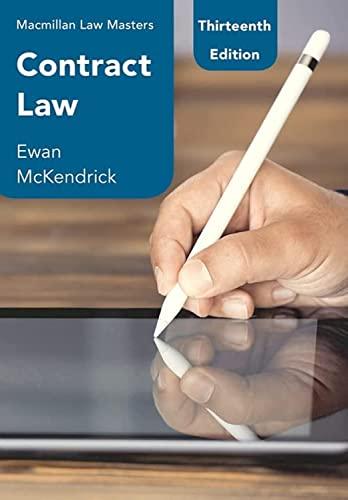Question
Hi. I have written my law exam asnwers. could you check if the answers are correctly written in ILAC method? and if not, can you
Hi. I have written my law exam asnwers. could you check if the answers are correctly written in ILAC method? and if not, can you guys correct it.
QUESTION 1 One day, Dave is driving his car through the city when he is stopped by police. The police give Dave an infringement ticket for $495 for using a mobile phone while driving. Dave says that he could not have been using his mobile phone while driving. He argues that on the day of being issued the infringement ticket, his mobile phone was being repaired and that he did not have the phone in his possession. The next day, Dave visits Peter, a lawyer, for advice on how to challenge the infringement ticket. During their discussion, and after reading the legislation, Peter says that Dave has up to 28 days from the incident to send a letter to the police explaining why the infringement ticket should be cancelled. Relying on Peter's advice, Dave sends a letter to the police 21 days after the incident, stating that police had made a mistake in issuing the infringement ticket. The following week, Dave receives a letter from the police stating Dave's letter could not be considered because it was not sent within 14 days as required by legislation and as stated on the infringement ticket. Dave then finds out that Peter had referred to outdated legislation when giving Dave the legal advice and that the current legislation allows a 14 day time period for a response, not "28 days" as Peter had advised. Advise Dave on whether he can sue Peter under Tort Law.
Answer -
Key Facts/ issue(s) from Dave's infringement ticket scenario
The situation at hand prompts a yes opinion on the next move Dave should undertake. The case scenario shows that Dave, although he was driving through the city, the police stopped him and unexpectedly issued him with an infringement ticket for $495 as affine for using a mobile phone while driving. The argument Dave offers in objection to the infringement ticket is that his mobile phone was at a repair center on the very day he was issued the ticket. It implies in the first place that the police did not follow the due diligence in finding the evidence or proof that Dave was actually driving while on phone. The development raises an eyebrow regarding how the police concluded that Dave was having a mobile phone activity while driving. His idea of seeking legal advice from a lawyer is informed by the fact that the police conduct was not clear and lacked basis. All the same, his efforts to find suitable information about how to proceed brought in another complication that was subject to the tort law. When Dave went to see Peter, whose profession is law, the advice Peter was to give relied on the notion or conception that the lawyer was well informedabout matter of the law. Peter was in a position to examine all the factors around the infringement ticket andadvice Dave according to the latest findingson the that could have allowed Dave proceed in the right way to avert any damagesor costs.
Relevant law
It is possible that Dave can sue Peterunder the Tort law because Peter gave him wrong advicethe led him send a letter to the police several days before the maximum allowed by law. The possibility comes from the basic or fundamental idea that a tort regards an act or omission that gives rise to injury or harm to another person that amounts to a civil wrong for which courts impose liability (James and Thomas, 2019). Tort manifests in three forms, negligence, strict liability, and intentional torts.Negligence is the most common among all cases involving tort and negligence takes place when a tortfeasor carelessly does his duties and directly causes harm to another person. Negligence has numerous elements among which causation manifests as the actual cause. It implies that but for the negligent omission of the defendant the plaintiff would not have been harmed or exposed to financial damages in terms of cost or fines incurred. In this view, the tort law brings about a few elements that highlight the scenario and circumstances under which an individual may seek a court's input and verdict in matters relating to action between people in a society or community.
Application of the Tort law
Given the idea that the law of tort relateto the element of negligence as the most common among all cases involving tort and negligence takes place when a tortfeasor carelessly does his duties and directly causes harm to another person.As noted earlier, negligence has numerous elements among which causation manifests as the actual cause. It implies that but for the negligent omission of the defendant the plaintiff would not have been harmed or exposed to financial damages in terms of cost or fines incurred. In view of this, Peter's failure to read the updated law directly caused Dave to delay sending the letter at the right time (James and Thomas, 2019). Therefore, any damages caused or incurred as result based on Peter's legal advice. As lawyer, Peter was obligated to offer services o advices as a practicing lawyer who works while relating with new developments in the law at all times.
Conclusion
The courts should find that it necessary to hold him accountable and shift the burden of the infringement ticket cost of $495 and any other costs that might be incurred in the process of seeking for justice.
Step by Step Solution
There are 3 Steps involved in it
Step: 1

Get Instant Access to Expert-Tailored Solutions
See step-by-step solutions with expert insights and AI powered tools for academic success
Step: 2

Step: 3

Ace Your Homework with AI
Get the answers you need in no time with our AI-driven, step-by-step assistance
Get Started


